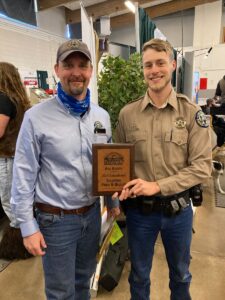
ANS inspector uses a flashlight to look into tiny crevices of a boat engine where invasive zebra and quagga mussels attach themselves
DENVER – CPW is expanding its aquatic nuisance species roadside inspection program to more locations and days in 2023 following a successful pilot year that saw 26 boats intercepted with highly destructive invasive mussels.
Year-to-year increases in mussel-fouled watercraft entering Colorado led CPW, through HB21-1226, to experiment with expanding its watercraft inspection and decontamination program to include temporary roadside inspection stations. In 2022, CPW, in collaboration with Colorado State Patrol Port of Entry Staff and the Colorado Department of Transportation, led three inspection events at the Loma Port of Entry, which were highly successful. A total of 138 watercraft were inspected, 60 were decontaminated and 26 were confirmed to have adult mussels.
“While the vast majority of mussel-fouled boats entering Colorado are coming from Lake Powell, there are an increasing number of waters in surrounding states infested with invasive mussels,” said Robert Walters, CPW’s ANS program manager. “Recent detections like those in western South Dakota have only heightened the risk of mussel-fouled watercraft entering the state.”
Invasive zebra and quagga mussels are destructive to both fisheries and water infrastructure because fish do not typically eat them and they attach themselves to docks, rocks, shorelines and boats and clog pipes and pumps that supply fresh water to cities and towns across the state.
“For year two of this pilot program, CPW is looking towards other ports of entry and welcome centers to implement single-day check stations similar to the first year of the pilot program,” Walters said. “The intent of this effort is to provide valuable data that will broadly inform the future application of this roadside ANS inspection program in Colorado.”
CPW will be expanding roadside ANS inspection operations to seven additional locations in 2023, with operations occurring in two different locations on each event date.
ANS Roadside Check Stations in 2023
- May 19 – Cortez Port of Entry & Julesburg Welcome Center
- June 23 – Dinosaur Welcome Center & Lamar Port of Entry
- July 28 – Alamosa Welcome Center & Trinidad Port of Entry
- August 25 – Dinosaur Welcome Center & Burlington Welcome Center
- September 22 – Cortez Port of Entry & Julesburg Welcome Center
About the ANS Program
The Colorado ANS Program was authorized by the Colorado Legislature in 2008 utilizing severance tax funds and in 2018 the Colorado General Assembly provided funding to the program through SB17-259, funding the program through boating registration fees from residents and non-residents.
Since CPW’s ANS inspection program started in 2008, 6.5 million boats have been inspected and 199,465 boats have been decontaminated. The agency is aided in the program by Colorado counties, municipalities, water districts, federal agencies and private companies that also conduct inspections. CPW also works proactively looking for aquatic nuisance species by sampling waters throughout the state. In 2022, crews sampled 180 standing waters and fourteen flowing waters and the National Park Service provided 56 water samples; these intense sampling efforts resulted in the early detection at Highline and emphasize the importance of this program.
CPW has also been instrumental in establishing the Water Inspection and Decontamination (WID) protocols which are now used by states throughout the nation. Agency staff also are active with the Western Regional Panel on Aquatic Nuisance Species Watercraft Inspection and Decontamination Committee.
Walters said that CPW will always remain vigilant in the fight against mussels.
“Mussels aren’t going away. However, by continuing our preventative watercraft inspection program Colorado can continue to set an example in the West and keep our waters clear of highly destructive invasive species.”
For more information about aquatic nuisance species and CPW’s ANS program, visit our website or read the Boater’s Guide to ANS Inspections.
















